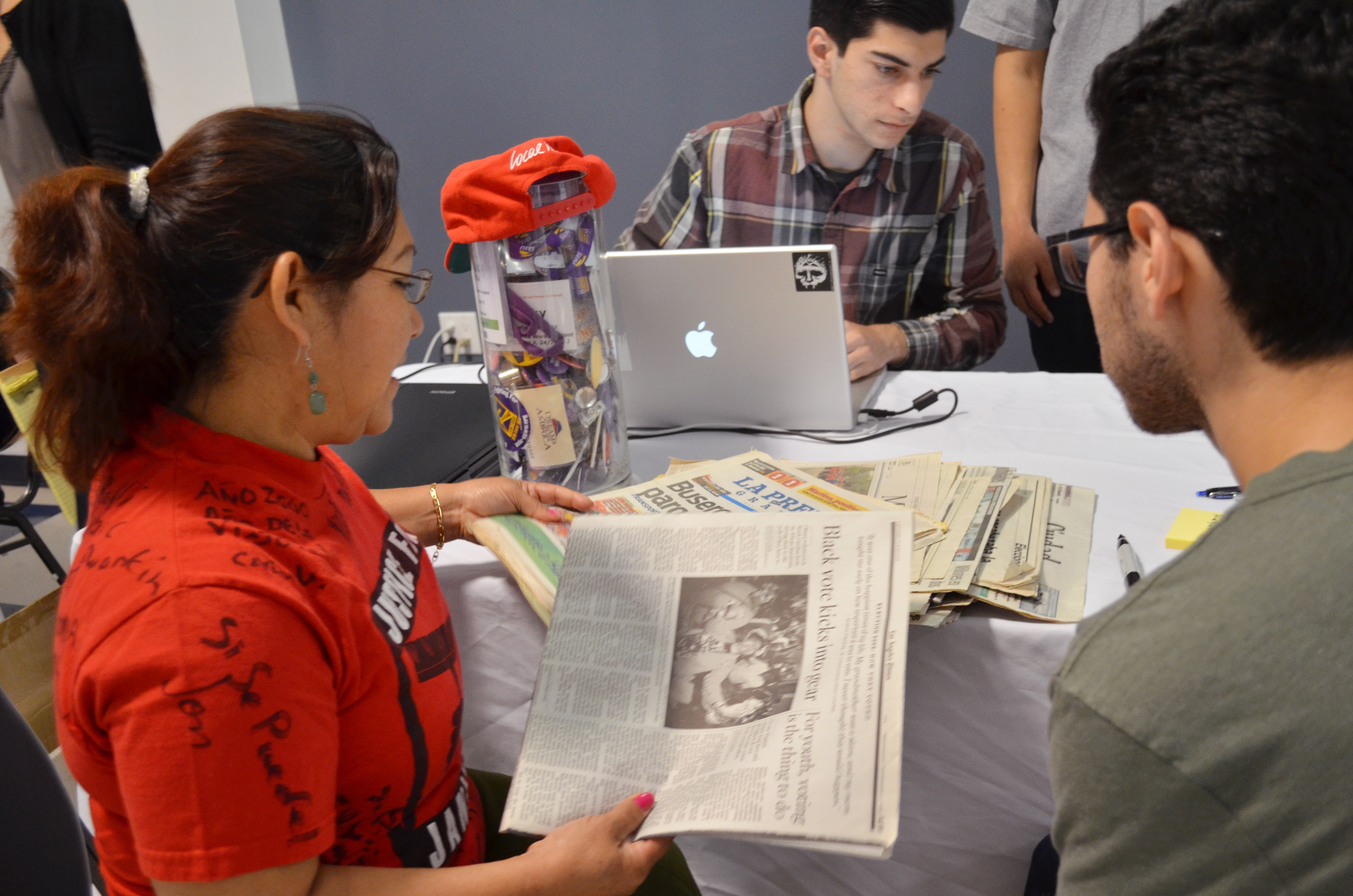Project preserves union history

Union activist Victoria Marquez (left) shares her personal collection with UCLA students Jon Raissi (center) and Andrew Gomez (right).
Courtesy of Tobias Higbie
By Suzy Strutner
May 20, 2011 10:11 a.m.
Jono Schaffer once sat with hundreds of fellow strikers on the curb of a bustling L.A. street. Their statement stopped cars, created traffic and prompted highway patrollers to beg the workers to leave.
A member of the Service Employees International Union, Schaffer chuckles constantly in an online video while telling UCLA students of the times he went on strike. At the time, however, it was not a laughing matter, but rather a desperate quest for better working conditions.
Schaffer’s video interview is part of a project launched by two UCLA professors that aims to compile a complete history of the nationwide Justice for Janitors campaign, which encouraged marginalized workers to organize in a public fight for better working conditions.
The history project is a teaching tool for Gaspar Rivera-Salgado’s course on applied research. Rivera-Salgado is the project director at the UCLA Center for Labor Research and Education.
After talking with friends at the union’s L.A. headquarters, Rivera-Salgado realized many historic documents and pictures from the Justice for Janitors campaign were not properly organized and archived. He decided to get his students involved in the archiving process.
His students, along with those of history Professor Tobias Higbie, are learning how to conduct and log interviews, compile documents and organize photographs for the project. By the end of the summer, Rivera-Salgado hopes to have the entirety of their efforts displayed on the project’s already running website.
The Justice for Janitors campaign began in 1987, and its largest victory came in spring 2000. Clad in famously red “on strike” T-shirts, 100,000 janitors in Los Angeles demanded ““ and won ““ wage increases, health care benefits and new jobs from the real estate industry.
Union member Ana Castro has been cleaning bathrooms at a Wells Fargo building for 16 years. She took an active role in the strikes of 2000.
“I’m the one that used the mop,” Castro said in Spanish, adding that her likeness, a woman leading marches while holding a mop, was incorporated into a film about the strikes, “Bread and Roses.” “I was the symbol for all the news stories. I would always come out with my mop.”
Castro said her part in the strike generated the higher wages and social security benefits she enjoys today. UCLA students recorded her story and dozens of others on May 7 during an event held at the union, dubbed Justice for Janitors History Day.
Fourth-year international development studies student Linda Gonzalez said she hopes the project tells workers that they are capable of winning better conditions from corporations.
“I hadn’t expected to see a movement where women, especially immigrant women, were so empowered,” Gonzalez said of interviewing Justice for Janitors protestors. “One woman started crying when she told us how she had struggled and how her kids are now at college.”
Alma Martinez, a union member who shared her tale with students, said Justice for Janitors is responsible for the higher wages and medical benefits she now receives in her job as a janitor downtown.
She said the protests she has been involved in, especially the 2000 strike, need to be documented so union members can show their children what it takes to generate change.
Union veterans see the project’s archives as a way to teach often-apathetic younger members about the power of protest, said graduate history student Caroline Luce.
“It’s amazing to see how surprised the workers are that somebody wants to hear their story,” said Luce, who recovered hundreds of documents from the union building’s basement. “They’re just awakening to how accomplished and admirable they are.”
Despite their past gains, the janitors’ work is not finished, said union spokesman Mike Chavez. The county’s janitorial contract for hospitals ends soon, and officials are considering swapping union workers for employees of Sodexo, an international management company.
“In June we’re going to have a big march through all the buildings downtown,” Castro said of her plans to tackle this new issue. “This is something we’re trying to push. … We have to go and do picket signs.”
A recording of Castro’s interview with UCLA students will soon be posted on the history project website alongside Schaffer’s currently available video commentary.
In his video, Schaffer describes marching through buildings and stopping traffic; younger members can now access this interview online as a new chapter in the union’s fight begins. Schaffer’s characteristic chuckle is present throughout the tales of struggle.
After rubbing an eye and pausing for a moment, ready to recount his days as a striker, Schaffer smiles and tells viewers, “We had a different way of doing things in L.A.”

